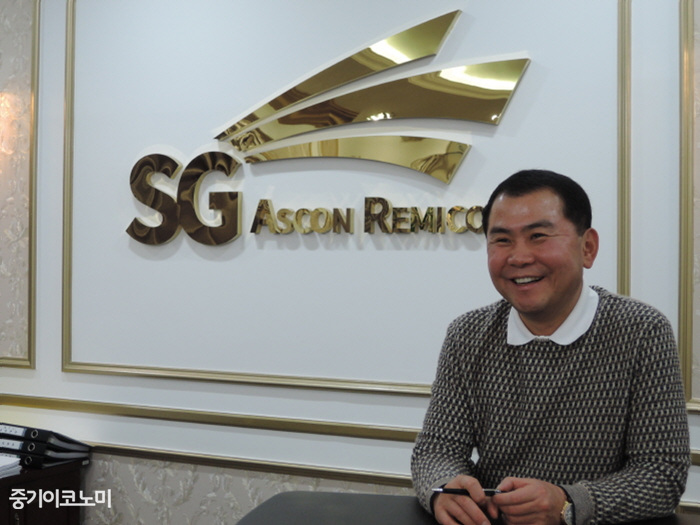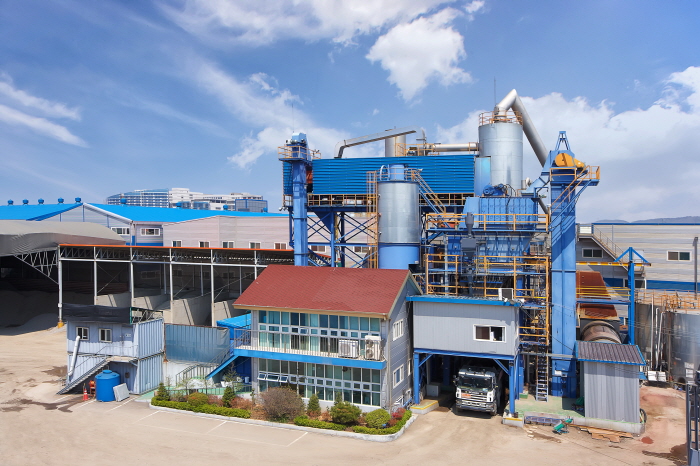"Game changer to reorganize the domestic Ascon industry".
There are 530 domestic ascon companies nationwide that make facilities that are the basis of infrastructure such as roads and housing sites. The problem is that there are far fewer companies that can produce and commercialize ascon materials suitable for eco-friendly policies.
Starting as a single-person company in 2000, it rose to No. 1 in the industry seven years after its establishment with a differentiated strategy that overturned the framework and practices of existing industries and won the title of the first listed company in the domestic Ascon industry. The company is actively renewing its image as an eco-friendly company by breaking the prejudice that it is an industry far from eco-friendly and pursuing continuous ESG management.
In a meeting with the Korea SMEs and Startups Economy, SG CEO Park Chang-ho stressed that in order to discuss the future development of the Ascon industry, the priority is to break the prejudice recognized as a representative industry that goes against the environment. In order to make Ascon, it is necessary to damage forests 100 times the area of Yeouido every year. Ascon is produced by making aggregates using stones from the cutting process, which causes air pollutants such as sulfur oxides and nitrogen oxides, as well as first-class carcinogens such as benzene and benzopyrene.

Park Chang-ho, CEO of SG Co., Ltd., emphasized, "In order for small and medium-sized companies to be competitive in the market, it is important to develop new technologies, bold execution power, and talented people who can support them." © Medium-sized economy.
"The system was reorganized to have the productivity of eco-friendly still palettes".
The only way companies can survive in infinite competition is to prepare for the future, and SG first benchmarked overseas cases and systemized them to suit domestic conditions. CEO Park expressed regret, saying, "In Europe, the United States, Australia, and Japan, steel palt products that have eco-friendly recycled slag have already been commercialized 30 to 40 years ago, but asphalt mixtures using natural aggregates are still used in Korea."
Steelpalts eco-friendly recycling of slag, an industrial by-product, can reduce the environmental load caused by waste treatment, boast premium quality of high strength and low noise, reduce fine dust, and more than double the use period of roads. Therefore, social costs due to road renovation and repair can also be reduced. In other words, it is a social waste not to use stillpalts, which have already been used for granted overseas, in Korea.
In other developed countries, SG has reorganized its system to have already processed steel pallet productivity. First of all, the company has been vertically integrated so that waste called asphalt waste ascon can be recycled and recycled back to ascon in one place.
"There have been companies that have tried to recycle waste to produce products, but no AP agency and aggregate production system, which are raw materials for Ascon, have structured the entire design, production, production, final construction, and maintenance."
When asked if the price would be expensive if the quality was excellent and eco-friendly, CEO Park said the price was set lower than the existing Ascon. In terms of raw materials alone, it is true that the price is higher than that of ordinary Ascon, but in order to commercialize it quickly, it is to reduce the budget of the government agency in charge of ordering and to give the recognition that it is a practical product that lasts a long time.
In addition, ascon eco-friendly facilities were developed. Since January last year, the government has regulated environmental emissions by law. If the allowable standard is exceeded, there are strong sanctions such as suspension of availability and cancellation of permission if repeated. The problem is that there are no facilities that can satisfy all of these. Accordingly, SG has created a facility that catches more than 98% of the emission standard.
Currently, SG has been jointly conducting national projects with POSCO and the Construction Technology Research Institute since eight years ago. SG also has exclusive patents and new technology rights for Steel Palt. POSCO and Hyundai Steel, Korea's two major steel companies, are both joint operators, while SG manages the business. As a result, steel companies can make steel materials that have been difficult to treat and dispose of the remaining by-products, and ascon companies can increase their competitiveness by registering waste as national standards and producing patents.
"More than 50% of Korea's Ascon will be replaced by SG's steel pallet".
Even if good cases from overseas are benchmarked and brought in according to the situation in Korea, and technology is developed to industrialize them, it is not enough to grow pie in the entire industry. CEO Park also expressed regret over the domestic ascon industry.
"Our country is in a position to lead the world in high-tech industries such as IP and bio, but it is true that the level of the Ascon industry is quite lagging. In the case of overseas countries, multinational companies often lead the industry, because Korea is the only country that is bound to be a small and medium-sized business. As a result, 530 factories are operated small as a single factory, so the R&D research environment is poor and it is bound to fall compared to foreign companies that generate tens of trillion won in sales."

The panoramic view of Seoul, Gyeongin, Yeongjong, and Western Ascon sites.
The good news is that the Ministry of SMEs and Startups selects its own small and medium-sized businesses every three years, and asphalt and Ascon products were lifted from the "Competitive Products between Small and Medium Businesses" in December this year. Concerned that small and medium-sized companies might fall behind if large companies temporarily enter the market, CEO Park said, "Only some of the metropolitan area and Chungcheong areas have been lifted because small and medium-sized companies could collapse if large companies enter the market at once. Since SG's factories are concentrated in the Seoul metropolitan area and South Chungcheong Province, this opportunity has given us room to expand the factory with more aggressive M&A, he said.
Since large companies need time to fully enter the market, it is a great opportunity for small and medium-sized companies to expand the market. It is a chance to diversify in an unrealistic business structure in which each company has to operate only one factory if it is grouped into a unique industry of small and medium-sized enterprises. Currently, new licenses are not allowed due to environmental problems, so large companies must acquire existing companies in order to enter the industry. Therefore, SG's goal is to raise its domestic market share to around 50% before the market is fully released, achieving 1 trillion won in annual sales in the future from 130 billion won in current sales.
According to CEO Park, more than 50% of Ascon in Korea will be replaced by Steel Palts of SG as the market is expected to open nationwide in three years. This is a great opportunity not only for SG's growth but also for the quality of domestic Ascon industrial products to be completely changed.
From a one-person company to a number one company..."Looking forward to revitalizing the SOC industry next year".
CEO Park Chang-ho, who was an ordinary office worker during the IMF period when everyone was going through a rough time, said he was always anxious, "I'm not going to get fired like this, right?" Since the government did not have a budget, there was no order for the SOC industry itself, so the company also ran out of work. CEO Park, who shook off everyone's dissuasion and started as a one-man company in 2000, saw equipment work at the site during the day and ran business in the evening.
However, it was a "good move" to start a business in a difficult time. This is because the volume, which had not been ordered for several years after the IMF, was released at once, which served as an opportunity to expand the business. Based on this, it issued a professional construction license in July 2004 and established a corporation, and now it has begun to take on the shape of SG. In addition, it was difficult due to a decrease in SOC orders during the 2008 Lehman crisis, but from the following year, previously pressed supplies were ordered at once, becoming the cornerstone of growth. CEO Park predicted that the SOC industry will revive from next year, although the SOC industry has been greatly reduced as a large budget is directed toward health and welfare due to the current outbreak of COVID-19.
Another driving force behind SG's development is its differentiation policy. In order for any industry to rise to the top, it absolutely needs the courage to break the framework of existing industries and overturn practices. He is said to have been called the "Heresy of the Ascon world" at the time.
"At that time, the industry had to follow the union law. It was a system in which union members allocate supplies according to their business history, but it was unreasonable for a company like us that just rented a plant and entered the market in earnest. Then, when Roh Moo Hyun was president, limited competitive bidding was institutionalized as it changed to a competitive system. A single company was unable to participate in competitive bidding and was only able to participate in the union, when SG created its own union and won a contract with the Public Procurement Service in 2012.
This is the first case in which only the Public Procurement Service and the Ascon Association broke the practice of signing contracts for the first time and directly contracted with a government agency ordering Ascon.
CEO Park said he wants to be the company that treats employees the best throughout small and medium-sized companies. For him, the company is sometimes going well and sometimes difficult, but it is a growth momentum that employees go together.
"The industry is already being reorganized. In order for small and medium-sized companies to be competitive in the market, they develop new technologies and specialize in companies based on their experiences and know-how they have learned from a long time ago. For this, bold driving, execution, and talent are paramount. SG's final goal is to go beyond benchmarking overseas cases based on this and develop into a company that creates better "high-tech" than advanced countries abroad."
Kim Beomgyu